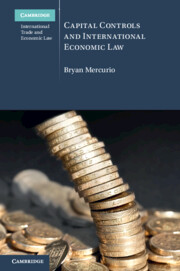Book contents
- Capital Controls and International Economic Law
- Cambridge International Trade and Economic Law
- Capital Controls and International Economic Law
- Copyright page
- Contents
- Foreword
- Preface
- Acknowledgements
- Abbreviations
- Part I Key Concepts: Capital Flows and Controls
- Part II The IMF, Capital Flows and Controls
- Part III Legal Frameworks, Rules and Conflicts
- 5 The Multilateral Trade Framework
- 6 Bilateral and Regional Trade Agreements
- 7 International Investment Agreements
- 8 Conclusions
- Bibliography
- Index
8 - Conclusions
from Part III - Legal Frameworks, Rules and Conflicts
Published online by Cambridge University Press: 18 May 2023
- Capital Controls and International Economic Law
- Cambridge International Trade and Economic Law
- Capital Controls and International Economic Law
- Copyright page
- Contents
- Foreword
- Preface
- Acknowledgements
- Abbreviations
- Part I Key Concepts: Capital Flows and Controls
- Part II The IMF, Capital Flows and Controls
- Part III Legal Frameworks, Rules and Conflicts
- 5 The Multilateral Trade Framework
- 6 Bilateral and Regional Trade Agreements
- 7 International Investment Agreements
- 8 Conclusions
- Bibliography
- Index
Summary
The analysis in the substantive chapters of the book have led to the following six observations and concluding remarks: (1) the IMF has regulatory authority over capital controls; (2) The WTO is not an impediment to the implementation of CFMs; (3) modern FTAs and IIAs are not an impediment to the implementation of CFMs; (4) Investment Tribunals and WTO Dispute Settlement Panels have interpreted the prudential exception broadly, fairly and reasonably; (5) a CFM taken in accordance with IMF recommendations or guidance is unlikely to conflict with modern trade and investment agreements; and (6) there is a potential convergence between WTO and international investment law. A recurring theme is that the risk of IEL instruments constraining governments has been overstated. The main risk lies not so much in IEL agreements per se but in those agreements that do not incorporate modern drafting techniques which limit or condition State obligations or provide for a wide range of safeguards to ensure that legitimate CFMs do not run afoul of treaty obligations.
Keywords
- Type
- Chapter
- Information
- Capital Controls and International Economic Law , pp. 184 - 195Publisher: Cambridge University PressPrint publication year: 2023

